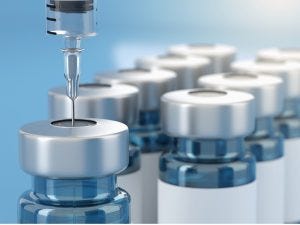
Moderna is confident of attaining 500 million doses of its COVID-19 vaccine candidate after using proceeds from a stock offering to scale-up manufacturing at its site in Massachusetts and at CDMO Lonza.
In May, Moderna Therapeutics raised $1.3 billion through the sale of shares. According to the prospectus, the funds were to be used for “raw materials, labor and capital equipment purchases related to the manufacturing of mRNA-1273,” Moderna’s messenger RNA vaccine candidate in late-stage trials for COVID-19.
This money has begun to be used “to scale-up at risk our manufacturing capacity in anticipation of a potential approval for mRNA-1273,” CEO Stéphane Bancel said during the biotech’s second quarter 2020 results call yesterday.

Image: iStock/undefined
“We started investing the proceeds for additional capital equipment at our Massachusetts plant, as well as the Lonza plants in New Hampshire and in Switzerland, ordering raw materials at large scale and hiring additional personnel to make mRNA-1273.”
Moderna’s 200,000 square-foot site in Norwood, Massachusetts opened in July 2018 and has capacity to develop materials for preclinical toxicology studies, Phase I and II clinical development programs, and the ability to manufacture, test and run fill/finish operations for its mRNA development candidates.
Since accelerating the COVID-19 program, Moderna has inked a deal with Lonza for commercial-scale production of the vaccine at the contract development and manufacturing organization’s (CDMO) sites in New Hampshire, US and Visp, Switzerland. Moderna also has partnerships with CDMOs Catalent and Laboratorios Farmacéuticos Rovi to support the candidate.
“We have invested in manufacturing at risk, ahead of approval to ensure supply, if our COVID-19 vaccine candidate is approved,” said Bancel.
He did not divulge to stakeholder exact inventory numbers, but said vaccines are currently being made and stockpiled at risk in order to achieve an initial minimum target of 500 million doses by next year.
“In terms of the capacity, I’ll confirm what we have said before, which is for 2021, the 500 million dose per year continues to be our base plan, meaning the team has a good sense of how to execute over that plan. And the team continues to work really hard over many different approaches, from new process, equipment to debottleneck, to find a path to 1 billion, which we still consider at this date as an upside. So, the base of 500, it’s your base case and the team is still working hard to figure out how we can get closer to a 1 billion capacity for ‘21 output.”
mRNA vs recombinant vaccines
mRNA-1273 delivers messenger RNA that codes for the “spike” protein of the novel coronavirus, aiming to coax cells into producing the protein that generates an immune response. The candidate is the leading mRNA vaccine candidate in the rush to tackle COVID-19, having entered Phase III trials late last month.
However, unlike other vaccines in the COVID-19 race, mRNA as a technology has not yet been proven commercially.
But if successful, Bancel said mRNA will offer major cost benefits over other technologies being implemented in coronavirus programs.
“Due to the platform nature of mRNA, we believe our mRNA medicines provide a higher probability of technical success to commercial launch and faster timelines to clinical trials and to the market relative to traditional medicines.
“We also believe that the manufacturing capital intensity of mRNA is materially lower than recombinant protein and the cost of manufacturing at commercial scale will be similar to small molecule injectables.”
About the Author
You May Also Like

schedl_b_and_w.jpg?width=100&auto=webp&quality=80&disable=upscale)
schedl_b_and_w.jpg?width=400&auto=webp&quality=80&disable=upscale)



